New Zealand-based husband and father of four inherits his father’s younger-onset Alzheimer’s.
ENTERPRISING
While participants at the Dementia New Zealand – Hawke’s Bay [Adult] Day Programme prepare to have their Thursday-morning tea, Alister Robertson steps into another room for a Zoom video call with The Caregiver’s Voice. It’s 12:30pm in California on Wednesday, a 21-hour time difference.
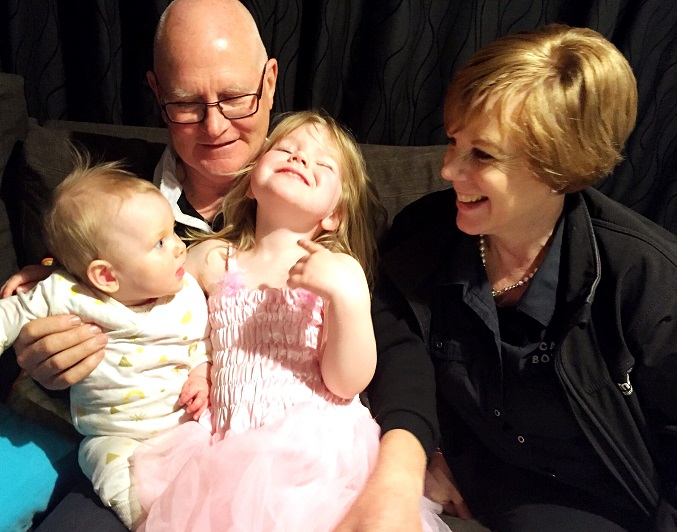 Click on or hover over each image to read the description.
Click on or hover over each image to read the description.
Alister graduated from Canterbury’s Lincoln University, before spending the next 30 years in banking. His wife, Charlene, served in administrative fundraising roles for nonprofit organizations. After their four sons were grown and on their own, the 50-something couple resigned from their jobs, sold their home in Hamilton, and followed their dream of owning and operating a motel. They built up the Taupo-based business before selling it and moving to the east coast of the North Island, to be closer to one of their sons and his family.
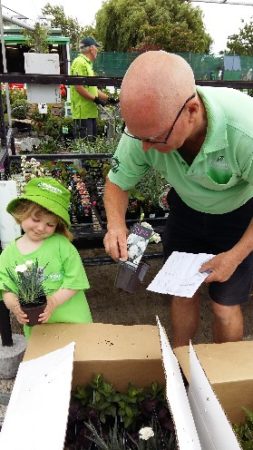 In Napier, Hawke’s Bay the enterprising couple couldn’t find a suitable motel to buy, so they bought a garden center with a café, instead. Charlene ran the café, while Alister managed the Palmers Napier Garden Centre. They both loved dealing with people and their complimentary skills helped them successfully manage their businesses or so they thought!
In Napier, Hawke’s Bay the enterprising couple couldn’t find a suitable motel to buy, so they bought a garden center with a café, instead. Charlene ran the café, while Alister managed the Palmers Napier Garden Centre. They both loved dealing with people and their complimentary skills helped them successfully manage their businesses or so they thought!
A POSITIVE EXPERIENCE – DIAGNOSIS
About six months later, Alister discovered he was having problems. “It was more with the executive functioning in the businesses we had… I just was not hitting it,” he explains. “As far as looking at the big picture and tying things together, I just wasn’t getting it. The business wasn’t functioning as it should.”
Meanwhile, Charlene was growing and managing the café.
“After a while, I mentioned to Charlene that I was having difficulty. I wasn’t picking up things I normally would.”
“I then went to the doctor and explained what I was experiencing. I also advised the GP [general practitioner] that my family had a history of Alzheimer’s, and I may have it too.” Alister says his father was also diagnosed with Alzheimer’s in his early sixties.
“In June of 2014, the doctor did some psych testing. She referred me to a neurologist. The neurologist did more psych testing [and then] referred me to a specialist team. In Hawke’s Bay, they are called Older Persons Mental Health Team, and they generally deal with people over 65. Instead of you going to them, they come to your home.”
“The clinical psychologist came and did numerous psych tests and explained it was more to set the baseline, rather than how well or poorly I did. I did reasonably well in those tests. She admitted she was not surprised due to my education and my work. She added that she needed to go back and explain the results to the pscyho-geriatrician who then visited me and confirmed the diagnosis. He was compassionate and very helpful as far as providing suggestions as to what I need to do now that I’m living with younger-onset Alzheimer’s.”
- Maintain social interaction.
- Eat a healthy diet.
- Limit alcohol consumption and don’t smoke. (I don’t smoke.)
- Get good levels of sleep.
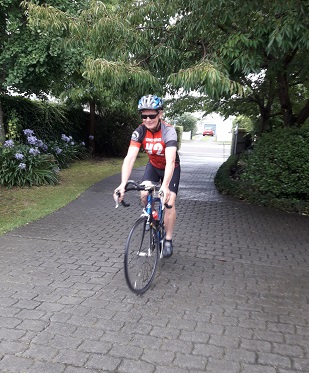
- Try to reduce as much stress as possible.
- Exercise as much as possible.
LIVING with YOUNGER-ONSET ALZHEIMERS
“In 2014, I was still road cycling as a primary mode of exercise. My wife was concerned if I should continue. The doctor advised me to keep doing the things I enjoy and am able to do. For safety and to reduce my wife’s concerns, we set up the GPS on my phone, so I could be tracked while cycling. My rides could be 80-100km [50-62 miles] on average.”
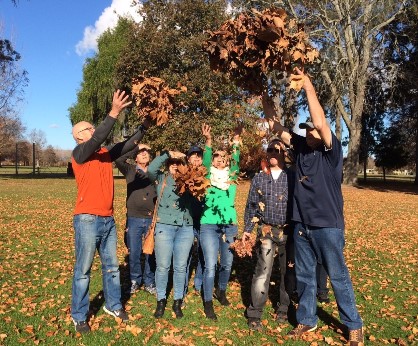 “I was referred to a five-day-a-week day care program. In addition, I received three months of cognitive stimulation therapy. The Dementia Hawke’s Bay [Adult] Day Programme I attend (called Mahana Club) is trying to continue this therapy program through activities such as creative artistic pursuits, visits to the gym, volunteering, or friendly team competitions answering general-knowledge questions.”
“I was referred to a five-day-a-week day care program. In addition, I received three months of cognitive stimulation therapy. The Dementia Hawke’s Bay [Adult] Day Programme I attend (called Mahana Club) is trying to continue this therapy program through activities such as creative artistic pursuits, visits to the gym, volunteering, or friendly team competitions answering general-knowledge questions.”
Alister’s sons’ reactions to his diagnosis range from denial to general acceptance. Alister is not sure how fully they understand what he’s experiencing.
CAREGIVING
Alister is understanding when he explains, “Charlene, has a lot more responsibilities, now that I’m unable to help. She’s my primary caregiver, she takes care of our home, and has taken over my responsibilities at the garden center on top of her own. (They sold the café.)
I asked, how she helps him.
“Probably, she does a lot of things I’m unaware of. She’s always been very good at organizing things…”
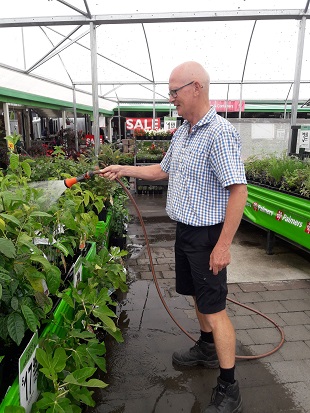
“What?” I interjected. “Alister, you’re a typical husband! You don’t even notice all the things your wife does.”
He laughed. “She does a lot of things in the background. I still help out at the garden center with simple tasks. Charlene has put strategies together to limit my contact with the customer for my benefit. [For example,] I don’t wear a uniform like the others. I will do the watering of the seedlings. While I’m doing that, customers will ask me if we have a certain plant or where it might be. That can be challenging.”
“What do you wish was better about your caregiver’s efforts?” I asked, explaining this is a delicate question. “After all, Alister, we’re talking about your wife, your business partner, and the mother of your children.”
He takes a breath and explains:
Charlene is under quite a bit of pressure and stress. She’s had to take over the business, and that’s not her area of expertise. Charlene has always been a great front person and organizer and I have always done the books and kept the back end of a business ticking along. Because of my inactions and some not so good actions, I’ve put the business in a precarious position.
She has difficulty with my short-term memory. There are things I’ll forget, yet I can recall things longer term. She’s aware of Alzheimer’s and short-term memory loss. But urgency and stress in her life cause her to get frustrated some times.
I’ve learned that I need to try and do one thing at a time.
If I have time in the morning, I will ask Charlene, “What do I need to do to help out with some of the house duties?”
She’ll start rattling off a list of things to do and I have to remind her that I can only process one thing at a time. I’d rather she write a list that I can go through at my own pace.
I know Charlene has trouble in that I cannot help her with problems. Our marriage is not as it was. She loves me, but we are really just flat mates now. I have no answers for her on business, personal, or emotional issues. I know she is sad.
The present and the future are not as we had dreamed it would be.
ADVOCACY
Like others we’ve featured in VOICES with Dementia, Alister gives back by volunteering, serving on boards, and giving up his morning tea to do a video call.
He recently helped prepare a briefing paper for the newly elected NZ Minister of Health on Dementia as a part of his service for the Consumer Advisory Group with Alzheimer’s New Zealand (NZ). He also volunteers on behalf of the adult day center sponsored by Dementia NZ, by raising community awareness that people with dementia still have abilities.
“Yvette Bibby, Team Leader at Mahana, returned from the Alzheimer’s conference here [in NZ] in 2016 and talked about Dementia Alliance International (DAI) and Kate [Swaffer]. With Kate’s urging for a strong advocate and representative to join DAI, I did and now serve on the board.”
Alister thanks Yvette Bibby for her referral to DAI and The Caregiver’s Voice thanks Valerie Schache, for referring Alister.








